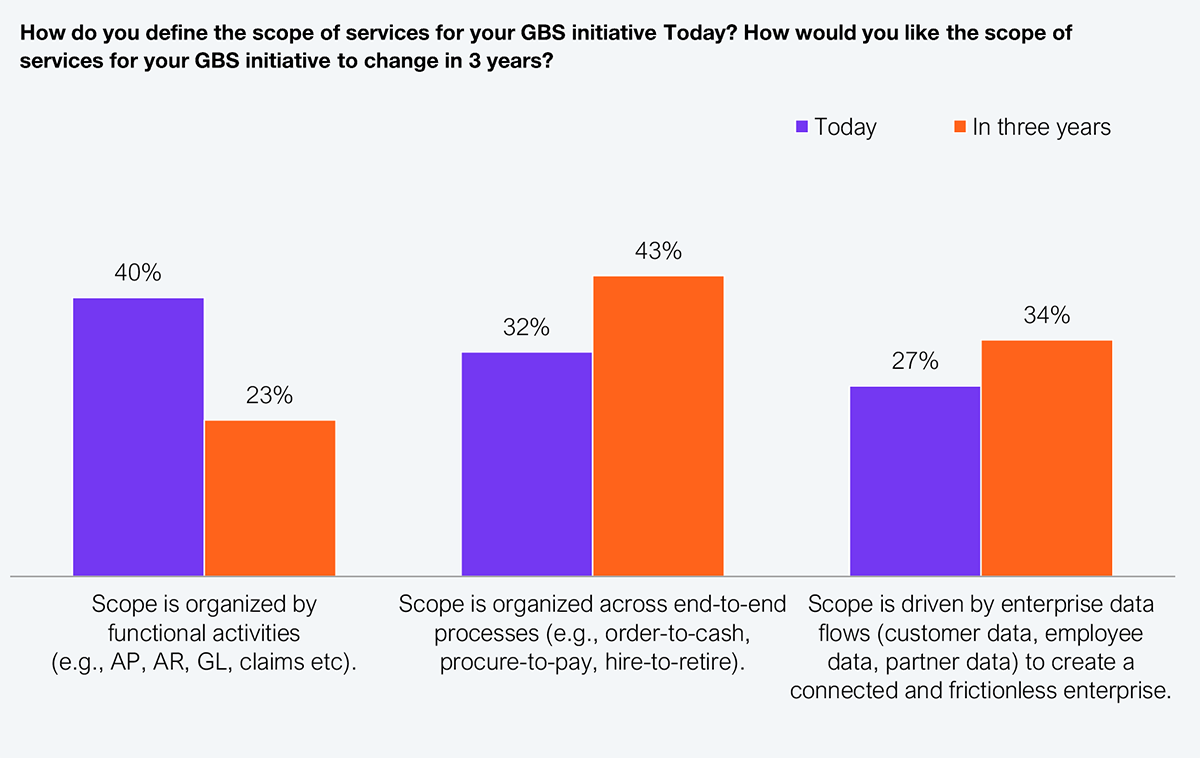The global business services (GBS) model has traditionally focused on efficiency: driving out costs, operational excellence, and consolidating back-office enterprise functions such as HR, finance, and procurement. However, this approach is inadequate in today’s complex environment.
Evolving GBS models must be AI-driven to help accelerate growth, innovation, and enterprise-wide transformations. At HFS’ recent AI Symposium, Capgemini’s David Lumley and HFS Research’s Elena Christopher had a fireside chat on this pertinent topic in a session aptly called “GBS is Dead. Long Live Generative Business Services” using data from a recently released joint study to frame the discussion.

Elena opened the conversation with an interesting question about David’s title, ‘Global Practice Head of Intelligent Finance and Accounting,’ asking him how Capgemini makes good on the intelligence part. David outlined how the market rapidly changed post-COVID and how organizations either boomed or failed. David succinctly summarized Capgemini’s differentiators: “The intelligent aspect of finance and accounting and broader business operations is twofold. One is how we use technology better and faster, but more importantly, it’s about the intelligence around our approximately 5,000 people delivering managed finance and accounting services to enterprise clients.”
While the enterprise GBS model cannot be discarded, it must be modernized to adapt to changing market conditions and leverage disruptive technologies such as generative AI (GenAI). Elena shared data from the study that show the GBS model is still relevant but needs a facelift (see Exhibit 1). David added, “COVID was a wakeup call, and it showed that business models need to be far more agile, to either scale up or down, depending upon the external conditions.”
GBS is indispensable for managing essential back-office functions, but it can be much more than that. Enterprises need growth, innovation, and digital transformation, and a GBS must step up to the challenge, pivoting from being a cost-cutting machine to a strategic powerhouse that aligns with these priorities.

Sample: 510 survey participants
Source: HFS Research in partnership with Capgemini, 2024
Our data show a significant shift in GBS operations from functional silos to more end-to-end collaborative approaches (see Exhibit 2). Elena asked David whether he is seeing this in action with his clients and if any value is being realized.
“It depends on the maturity that enterprises have,” he said. “The concept of outsourcing, GBS, and shared services has been around for roughly 25 years. However, many organizations are just starting that journey.” He shared an example of a US-based client that maintains all of its processes in-house due to cost pressures, organizing them by function. However, David suggested that enterprises can leapfrog toward end-to-end processes and data flows, which is where the
value is.

Sample: 510 survey participants
Source: HFS Research in partnership with Capgemini, 2024
Attracting top talent and investing in technology are crucial for GBS’ success. Elena highlighted that the traditional focus on cost efficiency and process standardization has shaped the perception that working in GBS is a low-value operational function (see Exhibit 3). This often deters high-caliber professionals from seeking careers in GBS, limiting the talent pool to individuals with a more transactional mindset.

Sample: 510 survey participants
Source: HFS Research in partnership with Capgemini, 2024
David supported Elena’s perspective: “I am privileged to lead a large number of dedicated personnel delivering finance and accounting services to multiple industry clients. Sometimes, I lie awake at night, thinking about how I can keep them growing and evolving. It’s hard because there are clients who still take a functional view and, on the other side, those who are super bold and innovative. We have to satisfy both sides while motivating and enabling the people.”
The idea is to leverage disruptive technologies such as GenAI to automate tasks, improve decision-making, and generate new insights while enabling human counterparts to focus on higher strategic and value-added activities.
David said he enables technology certifications for talent, including functional courses for various enterprise software and partner platforms. It combines them with domain expertise from years of experience at a particular industry level. David believes in combining emerging young talent alongside more experienced employees to ensure its teams are agile, experienced, and have the vital nuances needed for project completion and healthy growth and expansion of GBS functions.
Elena expanded on David’s points, stating that the mixed-resourcing model David talked about is crucial for project success, subsequent client satisfaction, and the evolution of the GBS model beyond labor arbitrage.
As a GBS leader, you have a golden ticket to transform your organization’s perceived value from cost-cutters to game-changers. It’s time to disrupt or get disrupted. Embrace this bold new world of GBS or risk being left behind.
Register now for immediate access of HFS' research, data and forward looking trends.
Get StartedIf you don't have an account, Register here |
Register now for immediate access of HFS' research, data and forward looking trends.
Get Started